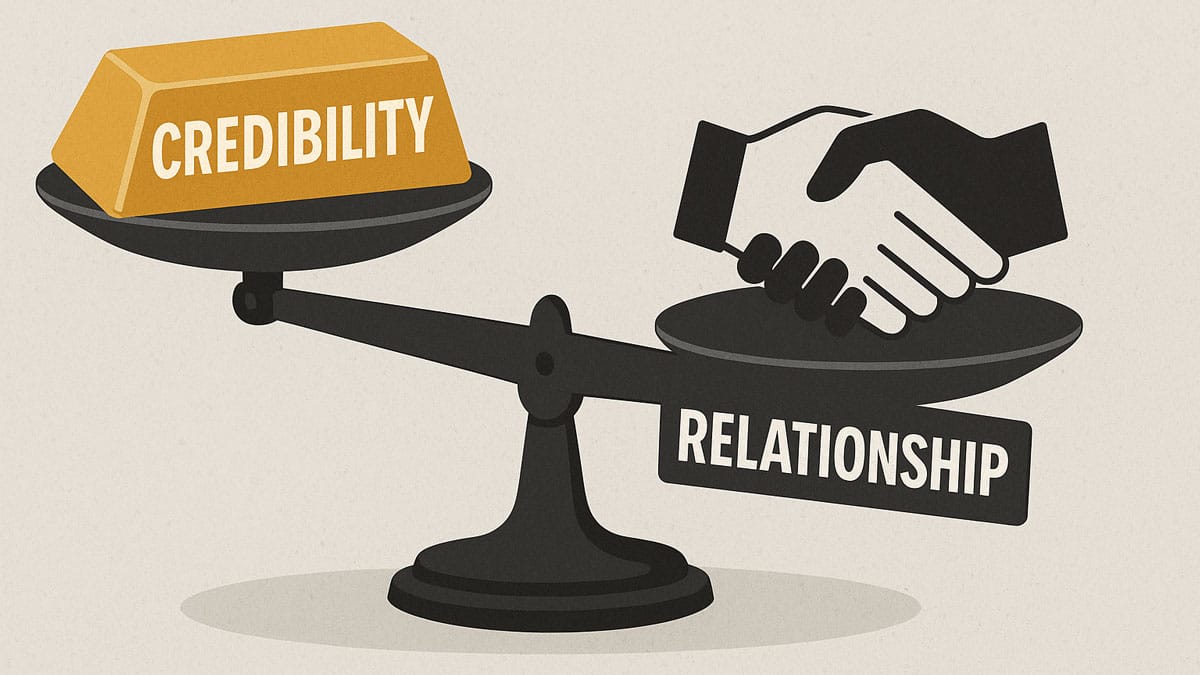Table of Contents
Let me tell you something that might make you uncomfortable.
Most sales guys – and I mean most sales leaders too – they talk about relationships all the time.
They think building relationships is everything in B2B sales.
They spend months chatting with customers, being friendly, going out for coffee.
And then they wonder why they’re not closing deals.
Here’s the problem: They’re only half right.
See, I’ve been watching this for years now.
Sales guys believe they’ve got great relationships with their customers.
But when the big decision comes? They lose.
Why?
Because there’s a massive difference between relationship and credibility.
The problem is that most sales guys don’t understand the difference between relationship and credibility.
The Problem with "Relationship-First" Selling
Here’s what I see happening.
Sales guys spend months, sometimes years, building what they think are solid relationships.
They tell me, “Oh, I have a great relationship with the customer.”
They’re talking to people in the customer organization regularly.
They feel good about these connections.
But when you go deeper – you realize something :
These relationships are transactional.
They’re only talking to junior or maybe medium-level contacts.
Maybe a few medium-level contacts if you’re lucky.
The customer likes them, sure.
But does the customer respect them?
That’s a completely different question.
And here’s the kicker – when decision time comes, these “relationships” fall apart.
Why?
Because the real decision makers don’t even know who you are.
So you end up with relationships that don’t matter when it counts.
The "Me Too" Positioning Trap
When you’re stuck in relationship mode, your entire positioning becomes “me too.”
Customer says: “We’re evaluating vendors.”
You say: “Great! We can do that too.”
Customer mentions a requirement.
You respond: “We have that feature also.”
See the pattern?
You’re just responding to what they ask. You’re not leading the conversation. You’re not adding any real value.
You’re just another vendor in their list.
In essence, you’re at risk of turning your solution into a commodity among countless competitors.
If you’re unsure how to create differentiation for commoditized products in B2B, check out this guide: How to Create Differentiation for Your Commoditized Products.
What Credibility Actually Means (And Why It Changes Everything)
Now let me explain credibility.
When you have credibility with a customer, something great happens.
They don’t just like you – they respect you.
And here’s the key difference:
- With relationships: Customer thinks “This person is nice to work with.”
- With credibility: Customer calls YOU when they have problems
When you have credibility, the customer starts seeing you as a consultant.
Not as a salesperson.
As someone who genuinely understands their business.
And here’s what I’ve learned after working with hundreds of sales professionals:
If you have relationship, you won’t necessarily establish credibility.
But if you have credibility, 99 out of 100 times you’ll have a good relationship.
And that relationship will be with the right customer contacts.
The decision makers.
How Great Sales Guys Build Credibility
So how do the top performers do it?
I’ve studied this closely, and here’s what separates the great sales guys from the average ones
1. They Add Value to Every Single Conversation
Here’s what separates average sales guys from great ones.
Most sales guys are reactive.
- Customer says “I need this,” they say “Yes, we can do that.”
- Customer asks a question, they answer it.
- Customer has a requirement, they try to match it.
Their entire positioning is “me too.”
“Oh, you’re looking at these other vendors?
We can also do everything they can do.”
This doesn’t build credibility.
This builds you into a commodity.
Top 5% Sales Guys: Always Add Value
They add value to every single conversation.
- In-person meetings
- Virtual calls
- Phone conversations
- Even email exchanges
They always have expertise, knowledge, or insights to share.
2. They Educate the Customers
Because great sales guys have this knowledge, they can educate customers.
- They know industry best practices.
- They understand the challenges.
- They’ve seen what works and what doesn’t across different companies.
So when they’re talking to a customer, they’re not just answering questions.
They’re teaching.
They’re opening the customer’s eyes to possibilities they hadn’t considered.
Educating your customers is an integral part of successful consultative selling.
3. They Ask Insightful Questions
You know what I love about great sales guys?
The way they ask questions.
These aren’t your typical “What’s your budget?” or “When do you plan to buy?” questions.
These are insightful questions that make customers stop and think.
I’ve seen this happen in meetings.
Great sales guys ask such questions that the customer has to pause. Think for a moment. Then answer.
And while they’re answering, something magic happens.
The customer realizes there’s a problem or issue they hadn’t thought about.
Great sales guys always ask questions that uncover the customer’s unstated needs.
4. They Share Information Differently
Average sales guys position themselves as “me too” vendors.
“You have all these vendors to choose from, and we can do everything they do.”
Great sales guys share information in a way that completely differentiates them.
When they explain their solution, the customer thinks:
- “Huh. I hadn’t considered that approach.”
- “That’s a different way of looking at this problem.”
- “This could actually solve more than just our immediate need.”
5. They're Not Afraid to Challenge (Professionally)
Here’s something most salespeople are scared to do:
Challenge the customer.
Great sales guys aren’t afraid of this.
But they do it professionally.
They do it in a way that creates wins for everyone.
They might say: “I understand why you’re thinking about it that way, but based on what I’ve seen at similar companies, there might be a better approach.”
And then they explain why
The Preparation That Sets Top Performers Apart
Now let me share something I’ve observed about the top 5% of sales people.
The way they prepare for meetings is completely different.
During our complex sales training programs, we usually enable sales teams to follow a comprehensive meeting preparation checklist.
Let’s say they have a meeting with the CIO of Tata Steel.
Here’s exactly what they do :
Layer 1: Industry Trends
First, they research the steel industry.
What are the top 3-4 trends affecting steel companies right now? What changes are happening? What challenges is the industry facing?
This isn’t hard to find with all the AI tools available today.
But most sales guys skip this step.
Layer 2: Company-Specific Analysis
Next, they go deeper on Tata Steel specifically.
What are the top 3 changes affecting Tata Steel as a company?
Recent news, acquisitions, leadership changes, Financial performance, Strategic initiatives they’ve announced.
Layer 3: Role-Specific Priorities
Then they get specific about the CIO role.
What are the typical top 3-4 priorities of a CIO at a large steel company? What challenges do they face? What metrics do they care about? What keeps them up at night?
Layer 4: Individual Motivators (Advanced Level)
This is the hardest part, but the most powerful.
What could be the individual motivators of this specific person?
- Business motivators – what do they want to achieve professionally?
- Personal motivators – what drives them?
Now I understand, uncovering individual motivators is difficult.
But the first three layers?
That’s not that difficult anymore.
With all the AI tools available today, you can research this stuff.
You can find industry trends, company information and understand role priorities.
The key is that great sales guys invest time in preparing for every meeting.
Other sales guys just show up and wing it.
Making the Shift: From Relationship to Credibility
1. Start With Your Next Meeting
You don’t need to overhaul everything overnight.
Start with your next customer meeting.
Before you walk in (or log on), ask yourself:
- What value am I bringing to this conversation?
- What insights can I share that they might not have considered?
- What questions can I ask that will make them think differently?
2. Build Your Knowledge Base
You need to become an expert in your customer’s world.
Not just your product. Not just your industry. But THEIR industry. THEIR challenges. THEIR goals.
Start reading what they read. Follow the same news sources. Understand the same challenges.
3. Change How You Share Information
Stop positioning yourself as “one of many vendors.”
Start positioning yourself as someone who understands their business better than they do in some areas.
When you share information, frame it like this:
“Based on what I’ve seen at similar companies…” “The best-performing organizations in your industry are doing this…” “There’s a challenge you might not have considered…”
4. Add Value During Every Conversation
Ask better questions
- Questions that make them think
- Questions that uncover hidden problems
- Questions that challenge their assumptions
Share valuable insights
- Industry best practices
- What you’ve seen work (or not work) with similar companies
- Trends they might not be aware of
The Compound Effect of Credibility
Here’s what happens when you consistently add value:
- After every client conversation, your perception in the customer’s mind increases.
- Every interaction makes you more valuable in their eyes.
With average sales guys, their perception stays the same.
Or sometimes it even goes down.
But with great sales guys, it keeps going up.
Meeting after meeting.
Call after call.
Email after email.
This is what I call the compound effect of credibility.
And this is how you transition from being seen as a salesperson to being seen as a consultant
The Bottom Line
Here’s what I want you to remember:
- Relationships are important, but credibility is everything.
- When you have credibility, relationships happen naturally.
- When you only have relationships, you’re always at risk.
The great sales guys understand this.
They invest in building expertise. They prepare for every interaction. They add value consistently.
And that’s how they get access to the real decision makers.
That’s how they close bigger deals.
That’s how they build sustainable success in B2B sales.
So stop just being nice to your customers.
Start being valuable to them.
That’s where real sales success comes from.
And that’s how you build credibility that lasts.




